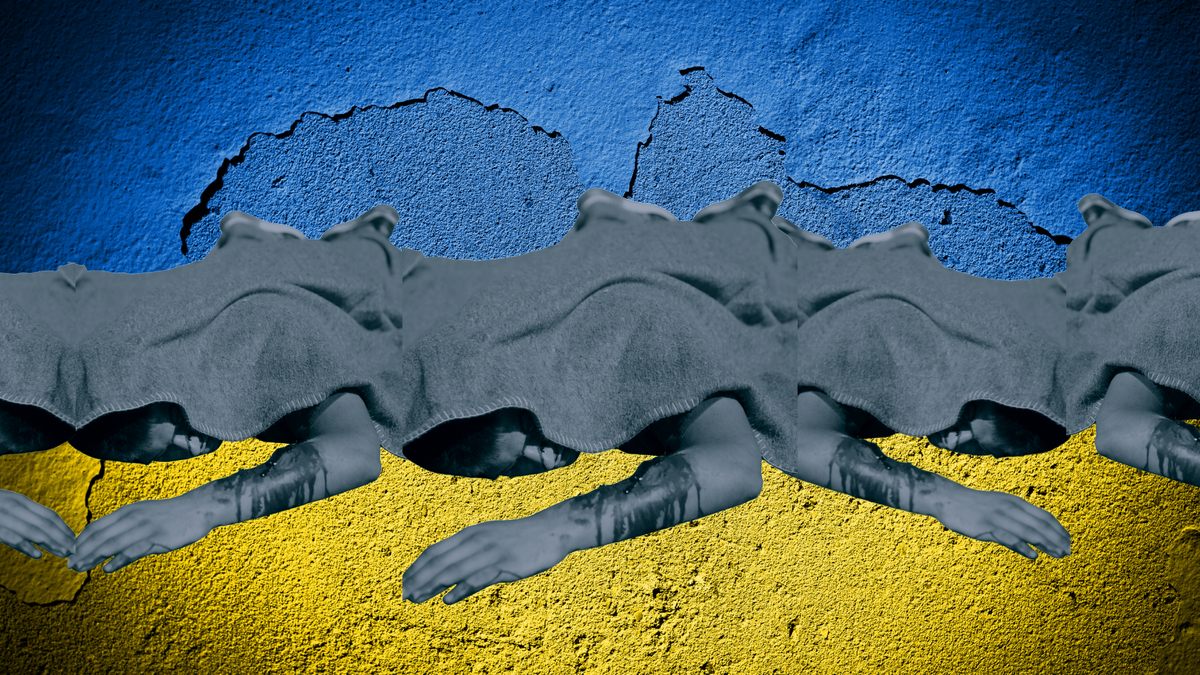Five Dead Naked Women in the Street: Bearing Witness in Ukraine
If no one speaks and remembers, the perpetrators prevail, and their acts of human destruction are forgotten.

We must bear witness.
We must not turn away in shock, disgust, or with the false notion that to look steals the dignity of the victims.
The photograph shows five dead, naked women in a pile on the road, surrounded by tires. (The original photograph has been deleted.) The Russians set the women’s bodies on fire. One woman, with bullet wounds in her body, is draped over the others. She is blackened and burned, but human bodies don’t burn easily.
The women were found on a highway 20 km outside Kyiv. We don’t know the details, but the women were likely trying to escape, like millions of other Ukrainians, but they were stopped by soldiers, removed from the car, harassed, raped, tortured, murdered, and set on fire.
Then, someone covered the bodies with a tarp, and photographer Mikhail Palinchak took another photo. Later, the Defence of Ukraine said there were four or five dead women. No one inspected the pile of bodies close enough to count how many women were there.
Dead civilians are seen near a highway 20 km outside of Kyiv. Under the blanket are 4-5 dead naked women whom the 🇷🇺 barbarians tried to burn right there on the side of the road. Photo by @mpalinchak#russiawarcrimes pic.twitter.com/QJxxznxte2
— Defence of Ukraine (@DefenceU) April 2, 2022
Another photograph of a pile of dead bodies alongside a road—three women and two children. They tried to escape from Bucha but were murdered when Russian soldiers shelled their car. Roman Motychak refers to the photo on Twitter: “I rarely share pictures from Bucha because this is too painful on a personal level…. but sometimes you just must share. Sometimes it feels like you betray the memory of these people if you don’t share it.”
These photos and many more like them, along with videos and interviews with victims and witnesses, document the ongoing Russian destruction of Ukrainian people—genocide.
Dead women and girls cannot speak. So, we must bear witness to their lives.
Bearing witness is not a passive activity; it requires active observation and truth-telling. Judith Herman, psychologist and author of the pioneering book Trauma and Recovery: The Aftermath of Violence—From Domestic Abuse to Political Terror, tells us: “remembering and telling the truth about terrible events are prerequisites both for the restoration of the social order and for healing of individual victims.”
Remaining silent makes us collaborators with rapists and war criminals. If no one speaks and remembers, the perpetrators prevail, and their acts of human destruction are forgotten.
Women are bearing witness by speaking about rapes and murders of women in other wars. To validate the rapes of Ukrainian women, a survivor of rape during the war in Kosovo, stepped forward to retell her story. Vasfije Krasniqi described being raped by two Serbian police officers. She reported the rapes, and a trial was held, but neither of the men was convicted. Now, she shares her story to help other victims.
Thirty years ago, in 1992, Serbian militaries set up “rape camps” for kidnapped women and girls near Višegrad in Republika Srpska. The Serbians turned a resort hotel called Vilina Vlas into a place of horror. They held 200 Bosnian women and girls, including one girl only 14-years-old, captive for four months, from May to August. They were raped and tortured; only a few survived. One woman, Jasmina Ahmetspahić, committed suicide by jumping out a window. In 2010, eighteen years after her death, her bones and 395 other people’s skeletal remains were found at the bottom of a lake near the hotel.
In an act of bearing witness, Nidžara Ahmetašević, a Bosnian journalist, visited the hotel ten years after the atrocities ended. She walked through the hotel, imagining and thinking about what happened there. She has returned several times to remember and pay respect to the women and girls who were tortured there.
After the war, the Vilina Vlas quickly reopened as a hotel and spa. Today, it is still a tourist resort promoted by the tourist authority. For several years, The Association of Women Victims of War has tried to have a plaque installed to memorialize the lives of the women and girls who suffered and died there. But it has been rejected, and the hotel and community continue to suppress the hotel’s history.
In 2016, Ahmetašević took the Egyptian journalist, Mona Eltahawy, to the hotel to bear witness to the rapes and deaths of the women and girls. They walked through the hotel together. Some rooms still had the same furniture as when the women were imprisoned there. Eltahawy wrote:
I could feel the spirit of the women and girls who had been kept prisoner in that concentration camp. I kept muttering to myself, “We remember you, sisters. We honour you, sisters” [emphasis added].
Women who were raped in the 1990s are giving Ukrainian women advice. Nusreta Sivac, a judge and survivor of rape in the Bosnian Prijedor concentration camp, has testified at the International Criminal Court in The Hague. She recognizes the pattern of rapes in Ukraine as similar to the ethnic cleansing and genocide perpetrated by the ethnic Serbs. The survivors advise the victims in Ukraine to gather any evidence available and document the crimes. One day in the future, they can demand justice. Sivac says:
I gave myself a task during the time I spent in the camps. That whole time I was daydreaming … that if I survive the camp … I would be talking about all that has happened in that camp for as long as I live. And, thank God, that is what I have been doing for over 25 years.
Sivac survived, and she spoke. She not only testified to her own experience, but she also talked about what she witnessed:
I saw with my own eyes … the most brutal crimes, but I kept talking about what happened and what I had witnessed. … I work[ed] with … another female survivor … to collect as many testimonies as we could, and in 1995, we were invited to the Hague to help prepare the first indictments for the ICTY (International Criminal Tribunal for the former Yugoslavia). I have testified many times against the perpetrators and architects of these crimes.
Sivac notes the importance of bearing witness to other survivors and tells victims to prepare to testify. She says:
My great satisfaction was the impact I had on other women—also war rape victims— who heard my story and decided to tell their stories as well, even if they were reluctant or ashamed to talk initially. I know that many women did not speak about their experiences because it is extremely difficult to think and talk about it, even for me today, but I have to be strong and let my voice be heard. I speak on behalf of those who were killed, those who didn’t make it, and those who are unable to speak.
Today in Ukraine, the rapes and murders of women and girls are the same, but several things are different. One is that communication technologies, such as cell phones with cameras, videos, and internet connections, are in many people’s pockets. Unlike the era of the Bosnian atrocities, now, “the world is watching the genocide online,” and war crimes are documented within days or weeks of them being committed. The perpetrators likely recorded photos and videos of their crimes which will be used as evidence against them.
Also, there are teams of forensic investigators in Ukraine to assist with documenting the violence against and murder of civilians, some of whom are buried in mass graves. The doctors have found evidence that some women were raped before being killed.
Connecting perpetrators to these crimes other than knowing they were Russians seems difficult, if not impossible, but even that is changing with the help of intelligence gathering and hacking. Intelligence agencies and hacker groups, such as Anonymous, have posted hundreds of thousands of personal data files on Russian soldiers. Personal information, including the names, birthdays, passport numbers, and job titles of 1600 Russian troops who served in Bucha, the site of documented war crimes, is now in the hands of investigators. It is unprecedented to access and publish this much information about the enemies’ military personnel. A Ukrainian official said:
We know exactly where and when a particular serviceman crossed the border with Ukraine, in which occupied settlement he stopped, in which building he spent the night, stole, and committed crimes on our land … We know their cell phone numbers, wives, children, their home addresses, who their neighbors are, where they went to school, and the names of their teachers.
By the end of April, the Ukrainian prosecutor general’s office published the names and photos of 10 Russian soldiers accused of kidnapping and torturing civilians in Bucha. Reports do not say how they were identified. These men, and the many more who will later be identified, have not been located or arrested yet; however, it is only a matter of time.
Movements to identify and prosecute war criminals have developed a long memory. For example, this week, the Bosnian state prosecutor’s office announced it had charged a former Bosnian Serb military policeman with a crime against humanity for participating in a massacre of 43 people in the village of Novoseoci in 1992—30 years after the crime. And last October, in a testament to the 76-year-long, dogged investigation and prosecution of Nazi war criminals from World War II, a 100-year-old SS guard went on trial for assisting with the murder of 3518 prisoners in the Sachsenhausen concentration camp near Berlin.
These are all acts of evil and war crimes. We cannot ignore them by looking away, either now or in the future. Bearing witness to atrocities requires us to “come face-to-face both with human vulnerability … and the capacity for evil.”
Although too many atrocities go unpunished, these few examples show the power of relentless refusal to be silent and the power of the tireless pursuit of justice.
The generous support of our readers allows 4W to pay our all-female staff and over 50 writers across the globe for original articles and reporting you can’t find anywhere else. Like our work? Become a monthly donor!
Enter your email below to sign in or become a 4W member and join the conversation.
(Already did this? Try refreshing the page!)





Comments